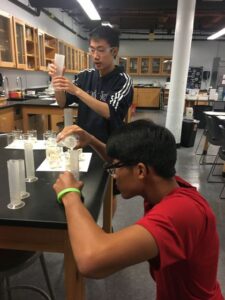The Boston Globe // Published June 23, 2022 // By Robert Knox

Quincy College is offering secondary school students a free summer program to learn about aquaculture — the practice of breeding, raising, and harvesting fish, shellfish, and aquatic plants.
Designed for students in grades 7 to 12, the weeklong “Aquaculture Camp” will introduce participants to the science of aquaculture through lab-based work in biology and field work performed on the Plymouth Bay coast.
Knowledge of aquaculture may prove to be a valuable career skill, said the course’s instructor, biology professor Michelle Abbott.
“There is an increasing demand for sustainable and environmentally safe sources of protein,” said Abbott, who lives in Pembroke.
Based on the college’s Plymouth campus at Cordage Park, the camp will begin on Friday, July 15, and after the weekend carry on from July 18 to 21. Hours are 9 a.m. to 2 p.m. except on July 18, when students will go on a field trip to Cape Cod from 9 a.m. to 4 p.m.
During the field trip, Abbott said, the owner of Brewster Oysters “Eastside” sea farm, Brian Daley, “will explain his operation of raising oysters from smaller than fingernail size to adults, ready for market.”
The class will then visit the A.R.C. (Aquacultural Research Corporation) Shellfish Hatchery in Dennis.
“Students will be shown how they spawn oysters, clams, and other shellfish, grow and then distribute them to growers, distributors, chefs and reef-builders across the country,” Abbott said.
The free weeklong camp is sponsored by a grant from Farm Credit East, a nonprofit supporter of agricultural activity. It will be limited to 12 students. “The idea is to keep the cohort small so as to offer more individualized instruction,” said college spokesman Scott Pickard.
Pickard said that registration for the Aquaculture Class has just begun. To find out more or to register, contact Cathie Maloney, the Dean of the Plymouth campus, at cmaloney@quincycollege.edu.
Abbott said that beyond the “how to” skills taught by the camp, the class teaches environmental lessons.
“Students are curious,” she said, “and my hope is as they realize we are all stewards of the environment they will continue to ask questions. Very soon they will be of voting age and will be asked to make decisions. I would like to see them use that curiosity to come up with ideas for environmentally safe and sustainable sources of food.”